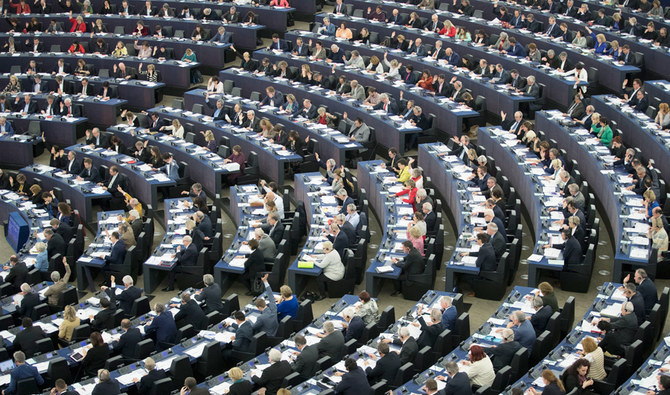ANKARA: The European Parliament has become increasingly critical about democratic backsliding in Turkey, with calls on Thursday for a complete end to accession negotiations with the country.
Members of the European Parliament (MEPs) said that Turkey should no longer receive pre-accession funding from the European Union budget as part of its candidacy process and for economic sanctions to be used as a stick against Ankara, which they called an “authoritarian regime.”
Although all EU governments would have to vote by a qualified majority to end Turkey’s 15-year-long stalled EU accession bid and cut funding programs, the escalating trend of criticism should be seen as a warning.
Last March the European Parliament also called for the suspension of EU accession talks with Turkey, over concerns about the violation of human rights and the rule of law. Ankara rejected the symbolic nonbinding resolution in favor of formally suspending EU accession talks with Turkey as “meaningless.”
Its Turkey rapporteur, Nacho Sanchez Amor, criticized the country for showing “constant distancing, underpinned by a lack of trust.”
FASTFACT
Although all EU governments would have to vote by a qualified majority to end Turkey’s 15-year-long stalled EU accession bid and cut funding programs, the escalating trend of criticism should be seen as a warning.
“Namely in the accession process, with a huge backsliding in human rights; in the current customs union, while we are quarreling at the World Trade Organization; in the visa liberalization, on which Turkey still has to comply with benchmarks, or in migration where the EU is complying with commitments, but Turkey uses it for putting more pressure,” he said.
While Sanchez Amor emphasized the need for keeping the accession process alive to use as leverage for supporting Turkish society, the head of the European People’s Party Manfred Weber said accession negotiations with Turkey were a historical mistake and talks should be stopped.
Germany’s Left Party also called on Brussels to halt its arms exports to Turkey.
Laura Batalla Adam, secretary general of the European Union Turkey Forum, said relations between the two sides had been at their lowest point for several years now.
“The political situation in the country and its estrangement from EU values have been the main cause of concern for Brussels,” she told Arab News. “Turkey’s increasingly assertive foreign policy today is creating new frictions in the relationship.”
Batalla thought that the visit of Josep Borrell, the EU’s high representative for foreign affairs and security policy, to Turkey this week signalled the bloc’s willingness to hear Ankara’s views on the pressing issues in its region.
“In times like these, dialogue is more important than ever. We need more cooperation rather than confrontation with Turkey,” she said. “However, this cooperation needs to be based on values and not only on interests. There is a will from both sides to make this happen but their success will depend on a true commitment,” Batalla added.
On Friday, the European Parliament gave the green light to earmark 485 million euros to Turkey for ensuring urgent humanitarian aid to refugees.
The EU had committed 6 billion euros in aid for the refugees being hosted in Turkey under a bilateral deal in March 2016.
However the full amount of aid is expected to be paid by 2025 – another point of friction between Ankara and Brussels. Turkey has accused Brussels of not fulfilling its promises for burden-sharing and for not taking any steps for achieving the pledged visa-free deal for Turkish citizens.
“The EP’s 2019 report on Turkey had also called for an end to accession negotiations,” Cigdem Nas, secretary general of the Istanbul-based Economic Development Foundation, told Arab News.
“The situation between Turkey and the EU has become even worse since then. In addition to problems related to democracy, rights and the rule of law in Turkey, geopolitical clashes in the Eastern Med, over Syria and Libya have further complicated Turkey-EU relations. The conflictual positions of some member states … over Turkey’s actions in the Eastern Med and Libya have led to a strong urge to counter and limit Turkey’s activism in the region.”
According to Nas, the recent events and debates in Turkey regarding further constraints on social media, interference in bar associations, and the status of the Hagia Sophia had also created additional concerns about the country’s political regime.
“It is no surprise that a majority of MEPs support a suspension or total ending of the accession process. In this regard the general affairs meeting which will be held on July 13 is also quite critical.”
But she believed that Turkey's hosting of 3.5 million Syrian refugees and holding one of the major transit routes toward the EU would make it hard for the member states to antagonize Ankara by stopping the accession process.
“As for further sanctions, several sanctions have already been decided upon in 2019. The accession process is practically frozen, customs union modernization talks have not started, visa liberalization is at an impasse. The EU does not really have any tools to use in order to put pressure on Turkey.”
Nas said that the use of EU funds might become conditional upon the fulfilment of political criteria.
“Funds could be made available mostly to civil society, refugee and human rights organizations, but not state organs or ministries.”


































